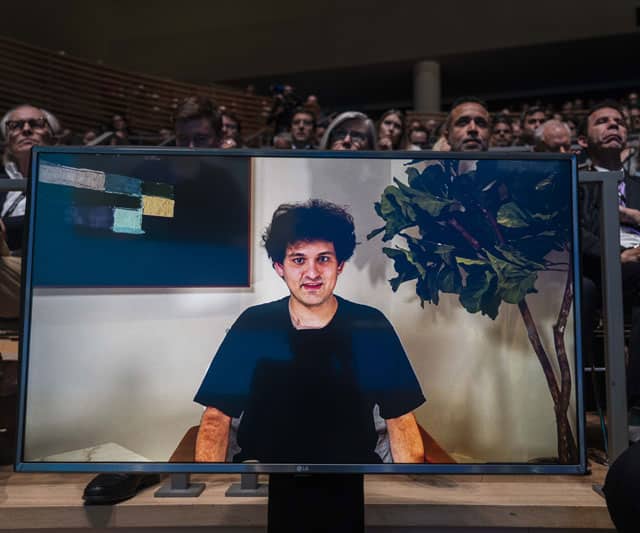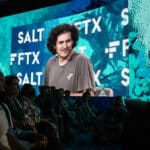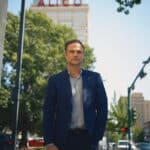At the height of its corporate power, cryptocurrency exchange FTX convened a group of athletes and celebrities for a charity event in March at the Miami Heat’s NBA arena. Local high school students competed for more than $1 million in prizes, pitching “Shark Tank”-style business ideas to a panel of judges that included David Ortiz, a former Boston Red Sox slugger, and Kevin O’Leary, an actual “Shark Tank” host.
But the event’s organizer was a figure better known in academic circles — Joseph Bankman, a longtime tax professor at Stanford Law School and father of Sam Bankman-Fried, the now-disgraced founder of FTX.
Wearing a baseball cap with FTX’s logo, Bankman walked onstage to help announce the winners of two $500,000 checks. Behind the scenes, he played the role of FTX diplomat, introducing his son to the head of a Florida nonprofit organization that was helping adults in the area set up bank accounts linked to the crypto exchange’s platform. Two months later, Bankman-Fried promoted the partnership in testimony to Congress, where he was pushing crypto-friendly legislation.
In the months before FTX filed for bankruptcy, on Nov. 11, Bankman was a prominent cheerleader for the company, helping to shape the narrative that his son was using crypto to save the world by donating to charity and giving low-income people access to the financial system.
Bankman and his wife, Stanford Law professor Barbara Fried, were more than just supportive parents backing their child’s business. Bankman was a paid FTX employee who traveled frequently to the Bahamas, where the exchange was based. Fried did not work for the company, but her son was among the donors in a political advocacy network that she orchestrated.
Now Bankman and Fried are under scrutiny for their connections to a business that collapsed amid accusations of fraud and misuse of customer funds. No evidence has emerged linking them to the potentially criminal practices that caused the exchange to implode. But their son was arrested Monday in the Bahamas after U.S. prosecutors filed criminal charges against him, and his fortune has dwindled to almost nothing. The charitable work that Bankman spearheaded has largely collapsed.
The couple’s careers have been upended. Fried, 71, resigned last month as chair of the board of a political donor network, Mind the Gap, which she had helped start to support Democratic campaigns and causes. Bankman, 67, has postponed a Stanford class he had been scheduled to teach in the winter, and he has recruited a white-collar criminal defense lawyer to represent him. The family faces huge legal bills, and they have become the subject of gossip on Stanford’s campus.
“I had a friend who said, ‘You don’t want to be seen with them,’ ” said Larry Kramer, a former dean of the law school and a close friend of the Bankman-Fried family. “I don’t see how this doesn’t bankrupt them.”
In a statement, Risa Heller, a spokesperson for the couple, said that Bankman worked for FTX for 11 months but that Fried had no role in the company. “Joe has spent a lot of his life trying to figure out ways to lift people up out of poverty,” Heller said. “Most of his time was spent identifying worthy health-related charities.”
Bankman-Fried, 30, said in an interview that his parents “weren’t involved in any of the relevant parts” of the business. “None of them were involved in FTX balances or risk management or anything like that,” he said.
Long before their son became a billionaire celebrity, Bankman and Fried were popular faculty members at Stanford, where they have taught since the late 1980s. At their home on campus, they regularly hosted Sunday dinners with friends and colleagues, which multiple attendees compared to a modern salon.
A leading taxation expert, Bankman has been an outspoken advocate for simplifying the tax filing system and has testified in Congress on tax matters. He also has a degree in clinical psychology and practices as a therapist.
Fried, who retired this year, is an expert on the intersection of law and philosophy, and has written about effective altruism, the charitable movement embraced by Bankman-Fried that uses data to maximize the benefits of donations. In 2018, she helped start Mind the Gap, hoping to bring “Moneyball”-style analytics to political spending, people familiar with her role in the group said.
The couple’s lives transformed after Bankman-Fried started FTX in 2019. He grew the company into a $32 billion business, cultivating a reputation as a hardworking do-gooder who barely slept and intended to donate his fortune to causes backed by the effective altruist movement.
Bankman and Fried supported their son’s work, although Fried expressed concerns about his lifestyle. “The sleep worries me,” she said in an interview with The New York Times in May. “I just hope that it’s not exacting a high price on him.”
Bankman-Fried’s business and political empire was always a family affair. The FTX founder was a prolific political donor, and he was part of a network of contributors who gave money to groups recommended by Mind the Gap, people familiar with the organization said. He also helped bankroll a nonprofit organization called Guarding Against Pandemics that was run by his 27-year-old brother, Gabe.
Bankman was deeply involved in FTX. In its early days, he helped the company recruit its first lawyers. Last year, he joined FTX staff in meetings on Capitol Hill and advised his son as Bankman-Fried prepared to testify to the House Financial Services Committee, a person familiar with the matter said. FTX employees occasionally consulted him on tax-related matters, the person said.
“From the start, whenever I was useful, I’d lend a hand,” Bankman said on an FTX podcast in August.
Bankman visited the FTX offices in the Bahamas as often as once a month, a person who saw him there said. Among the much-younger staff, he cultivated an avuncular persona, regaling employees with stories from his son’s youth, the person said. He and Fried stayed in a $16.4 million house in Old Fort Bay, a gated community in Nassau, the capital of the Bahamas; the couple’s names appear on real estate documents, according to Reuters, although Bankman-Fried has said the house was “intended to be the company’s property.”
Heller said Bankman and Fried “never intended to and never believed they had any beneficial or economic ownership in the house.”
As an employee, Bankman focused on FTX’s charitable operations. He put together the Miami event, selecting the teams of high school students who competed for $1 million in FTX grants.
Bankman also leveraged family connections to expand FTX’s reach. His sister, Barbara Miller, works in Florida as a political consultant and introduced him to Newton Sanon, CEO of OIC of South Florida, a nonprofit organization that helps people with workforce-development training to promote economic mobility. (Miller did not respond to a request for comment.)
Sanon worked with Bankman on a financial literacy initiative for low-to-moderate-income adults enrolled in education programs. As part of the collaboration, students who did not have bank accounts could open one linked to FTX’s platform, giving them the option to spend their money on cryptocurrency. Nobody was pushed to buy digital currencies through FTX, Sanon said, but one participant chose to do so.
In Washington, Bankman-Fried invoked the Florida program as he pressed for legislation to make the United States more hospitable to the crypto industry, testifying to a House committee that the initiative would help low-income people “build savings.”
After FTX collapsed, however, Sanon informed Bankman that some participants in the FTX initiative may have lost funds they had stored on the platform (including money that students had received as a stipend for joining the program).
“They wired money in for us to be able to take care of students,” Sanon said. He declined to specify the amount that the organization received, but he said it was “substantial and very kind.”
Bankman used his personal funds to cover the losses, according to his spokesperson. Sanon said that “none of us are happy with how this played out,” but that “those folks were very good to us.”
Not all of Bankman’s partners were so lucky. On Nov. 11, the day that FTX filed for bankruptcy, Bankman wrote to a Chicago nonprofit that had been promised $600,000 by FTX’s charitable arm. The money wasn’t going to materialize, Bankman said, and he couldn’t afford to make up for the shortfall himself.
“I’ll be spending substantially all of my resources on Sam’s defense,” he wrote in an email, which was obtained by the Times.
Bankman-Fried’s whole family has felt the effects of his actions. Gabe Bankman-Fried resigned from Guarding Against Pandemics in November. (He did not respond to requests for comment.) Fried stepped down from Mind the Gap, which held a meeting last month to elect an interim chair and discuss how to proceed without her, people familiar with the matter said. The stress of the situation is exacting a toll: Bankman looks as if he has aged 10 years in one month, a friend said.
Bankman and Fried are part of a small group offering Bankman-Fried legal advice, according to a person familiar with the matter. The couple has also turned to the Stanford faculty for support: David Mills, a criminal law professor at Stanford and a close family friend, is part of Bankman-Fried’s legal team. Bankman’s lawyer is former federal prosecutor Ronald White.Colleagues and family acquaintances are wrestling with what to say the next time they run into Bankman and Fried. Their son has widely been compared to Bernie Madoff, a notorious fraudster who ran the largest Ponzi scheme in history.
Still, many people in the family’s social circle view the situation through a sympathetic lens, according to interviews with more than a dozen friends and colleagues. They insist that Bankman and Fried couldn’t have known about any wrongdoing at FTX, while acknowledging that Bankman may have been naive in his embrace of crypto.
“It’s like a Greek tragedy,” said John Donohue, a colleague who has attended Sunday dinners at Bankman and Fried’s home. “The story of flying too close to the sun, and having your wings singed.”
c.2022 The New York Times Company. This article originally appeared in The New York Times.







